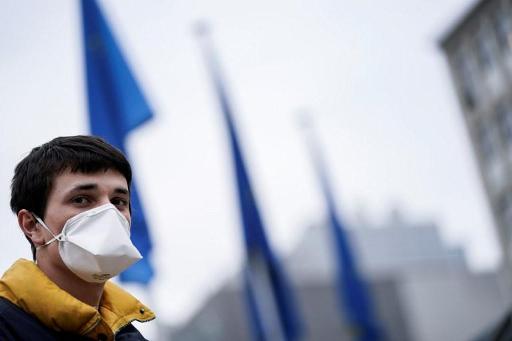An emergency doctor treating patients of the coronavirus pandemic said several young people who had been hospitalised were getting "severely ill" despite having no underlying conditions.
Doctor Ignace Demeyer, who works at a hospital in Aalst, said that lung scans from young people admitted into the emergency ward were "nothing short of terrifying."
"They all have the same complaints, they have been sick for a week so they stayed at home with the flu," Demeyer said in a TV interview. "And then they report [to doctors] with complaints of dry cough and shortness of breath."
When the presence of oxygen in their bloodstreams is checked, Demeyer said many exhibited very low saturation levels for their ages.
Demeyer said that the hospital was increasingly admitting patients between the ages of 30 and 50, which he said got "very ill" despite having "blank medical records."
"They are people who do not smoke, who have no other conditions such as diabetes or heart failure," Demeyer said, adding that doctors could "of course" still heal those patients but describing the situation as potentially life-threatening.
Related News
- Coronavirus: Belgium reaches 1,243 confirmed cases
- Belgium called on to go into all-out lockdown as EU mulls border closures
- Coronavirus Numbers: over 7,050 deaths worldwide
Demeyer's comments come after Belgium's put in place a range of restrictive measures in an effort to curb the spread of the virus, following the advice of its expert committee on the coronavirus.
"That is one of the reasons why we advised the government to implement those drastic measures and why we ask everyone to follow them strictly," Steven Van Gucht, a virologist leading the government's response to the outbreak, said.
'Not immune'
The emergency doctor's comments come amid wider reports that an increasing number of young people were being hospitalised due to the new coronavirus (Covid-19).
In Italy, doctors fighting to contain the spread of the pandemic in the second worst-hit country worldwide said that public being affected by the coronavirus was "changing."
“They are a bit younger, between 40 to 45 years old and the cases are more complicated," an Italian doctor told The Independent.
In the United States, the head of the national institute for infectious diseases warned younger age groups of the risks of not abiding by social-distancing guidelines, both for themselves and their communities.
"You are not immune or safe from getting seriously ill," NIAID head Anthony Fauci said. "The virus isn't a mathematical formula, there are going to be people who are young who are going to wind up getting seriously ill."
Fauci said that the likelihood that a young person who contracted the virus but developed no symptoms from it could pass it on to a more vulnerable person was also high. "That's why everybody's got to take this seriously, even the young.”
On Sunday, following reports that citizens in Belgium had organised indoor parties and even raves as a response to the nation-wide closure of bars and clubs, the caretaker prime minister urged young Belgians to heed social-distancing guidelines, saying the pandemic could not be beaten without them.
In Belgium, the number of confirmed cases of the virus jumped to 1,243 on Tuesday, according to the latest government figures, with the number of new cases remaining relatively steady (172 on Monday and 185 on Tuesday).
Gabriela Galindo
The Brussels Times

